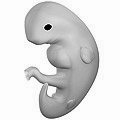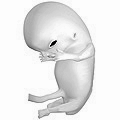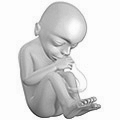Pregnancy: Difference between revisions
CSV import |
No edit summary |
||
| Line 22: | Line 22: | ||
When the woman's egg and the man's seed come together, it makes one cell called a ''zygote''. The zygote grows into an [[embryo]], which grows into a [[fetus]]. When the fetus is ready, the baby is [[birth|born]]. | When the woman's egg and the man's seed come together, it makes one cell called a ''zygote''. The zygote grows into an [[embryo]], which grows into a [[fetus]]. When the fetus is ready, the baby is [[birth|born]]. | ||
<gallery class="center"> | <gallery class="center"> | ||
Image:Month 1.svg|Relative size in 1st month (simplified illustration) | Image:Month 1.svg|Relative size in 1st month (simplified illustration) | ||
| Line 52: | Line 46: | ||
Sometimes there are problems with pregnancies. A [[miscarriage]] (spontaneous abortion) is when the baby dies before it is born. A [[stillbirth]] is when the baby is dead when it is born. There are also diseases caused by pregnancy. | Sometimes there are problems with pregnancies. A [[miscarriage]] (spontaneous abortion) is when the baby dies before it is born. A [[stillbirth]] is when the baby is dead when it is born. There are also diseases caused by pregnancy. | ||
Sometimes, women die from giving birth. In [[developed country|developed countries]], this is much less common than it used to be. Every year, about 500,000 women die from giving birth, while about 7,000,000 mothers have big problems from giving birth. | Sometimes, women die from giving birth. In [[developed country|developed countries]], this is much less common than it used to be. Every year, about 500,000 women die from giving birth, while about 7,000,000 mothers have big problems from giving birth. For example, giving birth can tear the mother's body and cause an [[obstetric fistula]]. | ||
== Abortion == | == Abortion == | ||
| Line 62: | Line 56: | ||
== Pregnancy test == | == Pregnancy test == | ||
[[File:Pregnancy test result.jpg|thumb|right|230px|A pregnancy test.]] | [[File:Pregnancy test result.jpg|thumb|right|230px|A pregnancy test.]] | ||
A pregnancy test is something that women use to tell whether they are pregnant. The woman urinates on the stick. If the woman is pregnant, a plus sign or two lines will appear on the stick. | A pregnancy test is something that women use to tell whether they are pregnant. The woman urinates on the stick. If the woman is pregnant, a plus sign or two lines will appear on the stick. If the woman is not pregnant, then a minus sign or one line will appear on the stick. | ||
== | == Pregnancy gallery == | ||
<gallery> | |||
File:PregnantWoman.jpg|Pregnant Woman | |||
File:Anatomia uteri humani gravidi V00001 00000002.tif|Anatomy of the Human Pregnant Uterus | |||
File:Melasmablemish.jpg|Melasma Blemish | |||
File:PregnancyinCrossSection.jpg|Pregnancy in Cross Section | |||
File:Pregnancy timeline.png|Pregnancy Timeline | |||
File:Distribution of gestational age at childbirth.jpg|Distribution of Gestational Age at Childbirth | |||
File:2904 Preembryonic Development-02.jpg|Preembryonic Development | |||
File:HumanEmbryogenesis.svg|Human Embryogenesis | |||
File:6 weeks pregnant.png|6 Weeks Pregnant | |||
File:10 weeks pregnant.png|10 Weeks Pregnant | |||
File:20 weeks pregnant.png|20 Weeks Pregnant | |||
</gallery> | |||
{{Pregnancy}} | {{Pregnancy}} | ||
{{Pathology of pregnancy, childbirth and the puerperium}} | {{Pathology of pregnancy, childbirth and the puerperium}} | ||
| Line 76: | Line 80: | ||
{{Sex}} | {{Sex}} | ||
{{Human sexuality}} | {{Human sexuality}} | ||
{{nt}} | |||
[[Category:Birth control]] | [[Category:Birth control]] | ||
[[Category:Family]] | [[Category:Family]] | ||
| Line 85: | Line 90: | ||
[[Category:Maternal health]] | [[Category:Maternal health]] | ||
[[Category:Pregnancy and childbirth]] | [[Category:Pregnancy and childbirth]] | ||
Revision as of 01:31, 30 March 2025

Pregnancy is when a female mammal has an unborn baby inside her. During pregnancy, a female is called "pregnant". A human pregnancy is about 38 weeks long, from conception to childbirth. Usually the mother has one baby at a time. Sometimes the mother has two babies at one time. Two babies are called twins. The mother can have three or more babies at one time. This does not happen very often.
Start
Pregnancy usually starts after a woman has sexual intercourse with a man. Her ovum (or egg) and his sperm (seed) come together and form a zygote (fertilized egg) inside her.

Some people have trouble becoming pregnant. This is called infertility. Women and men with infertility may take drugs or have surgery to help a pregnancy start. Some people use treatments that are not natural, like in vitro fertilization, to become pregnant with the help of a doctor.
Growth of the baby
When the woman's egg and the man's seed come together, it makes one cell called a zygote. The zygote grows into an embryo, which grows into a fetus. When the fetus is ready, the baby is born.
-
Relative size in 1st month (simplified illustration)
-
Relative size in 3rd month (simplified illustration)
-
Relative size in 5th month (simplified illustration)
-
Relative size in 9th month (simplified illustration)
Length
Human pregnancy is divided into three parts called trimesters. A trimester is about three months long. During the first trimester, the woman might feel ill in her stomach. She might have to urinate often. During the second trimester, the woman's abdomen starts to stick out. During the third trimester, her abdomen sticks out even more, and she becomes even heavier.
Birth
At the end of a full pregnancy, the woman's body pushes the baby out through her vagina. This is called delivering a baby or giving birth. Mothers can get help for birth from a midwife, nurse, or doctor. In some places, mothers give birth at home. In other places, mothers give birth in a hospital. Mothers who are ill or hurt may need to go to a hospital.
Giving birth can hurt a lot at the end. In hospitals, a doctor or midwife can give drugs to the mother to reduce the pain.
If the baby cannot be pushed out, then a doctor can cut the mother open to take the baby out. This operation is called a Caesarean section.
Social problems
The Convention on the Elimination of All Forms of Discrimination against Women says that pregnant women must be given time away from work or equal welfare for her baby without losing her job (Article 11).
Pregnancy problems
Sometimes there are problems with pregnancies. A miscarriage (spontaneous abortion) is when the baby dies before it is born. A stillbirth is when the baby is dead when it is born. There are also diseases caused by pregnancy.
Sometimes, women die from giving birth. In developed countries, this is much less common than it used to be. Every year, about 500,000 women die from giving birth, while about 7,000,000 mothers have big problems from giving birth. For example, giving birth can tear the mother's body and cause an obstetric fistula.
Abortion
A pregnancy can also stop without the baby being born. This is called abortion. Doctors can do things that will stop a pregnancy. Such an abortion is called induced abortion. Countries have different laws about induced abortions. Some countries allow it, and others do not. In some countries, it is allowed, but only for certain reasons, such as the pregnancy resulting from rape, or a doctor saying that the pregnant woman might die if the pregnancy is not stopped. People also have different opinions about abortion. Often, these are influenced by religious beliefs.
There are a few diseases that can kill a woman or make her very ill if she has a baby. Having abortions could save the lives or health of these mothers.
Pregnancy test

A pregnancy test is something that women use to tell whether they are pregnant. The woman urinates on the stick. If the woman is pregnant, a plus sign or two lines will appear on the stick. If the woman is not pregnant, then a minus sign or one line will appear on the stick.
Pregnancy gallery
-
Pregnant Woman
-
Anatomy of the Human Pregnant Uterus
-
Melasma Blemish
-
Pregnancy in Cross Section
-
Pregnancy Timeline
-
Distribution of Gestational Age at Childbirth
-
Preembryonic Development
-
Human Embryogenesis
-
6 Weeks Pregnant
-
10 Weeks Pregnant
-
20 Weeks Pregnant
| Pregnancy and childbirth | ||||||||||
|---|---|---|---|---|---|---|---|---|---|---|
|
| Pathology of pregnancy, childbirth, and the puerperium | ||||||||||||
|---|---|---|---|---|---|---|---|---|---|---|---|---|
* ' Category'
|
| Conditions originating in the perinatal period / fetal disease | ||||||||||
|---|---|---|---|---|---|---|---|---|---|---|
|
| Sexual and reproductive health | ||||||||||
|---|---|---|---|---|---|---|---|---|---|---|
|
| Human physiology of sexual reproduction | ||||||||||
|---|---|---|---|---|---|---|---|---|---|---|
|
| Development of the human body | ||||||||
|---|---|---|---|---|---|---|---|---|
|
| Outline of human sexuality | ||||||||||
|---|---|---|---|---|---|---|---|---|---|---|
*
|













